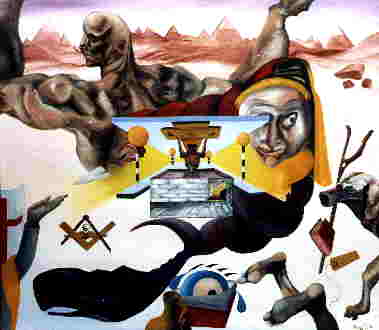
























Apocalyptical Tendency
( Size: 39" x 34" Oils on Canvas )
The United Nations voted for sanctions against Iraq.
Saddam Hussein uses this time to fortify his position within Kuwait.
The U.S.A., the U.N. the western allies and the ordinary peoples of the world
wait, knowing that if the sanctions do not work, war will be inevitable. As
the days, weeks, months pass on by, the war machine will be making ready.
Subjects in the painting:

The Whale
The Whale represents the destruction by pollution of the marine and wildlife habitats
situated around the designated war zone. The feet, with name tag, represent the dead from
both sides. It also represents the obsessive fear the U.S.A. has over the body bag
syndrome, they do not wish to savour another Vietnam.
This war will have to be fought before the weather gets too warm. The man central
on a cross represents the presence of the religions in and around the war zone.
Religious leaders are talking of an holy war, resurrecting the ideals of the early
crusades. The figure in red wearing an hat, represents President Bush's thoughts on
his idea for a "new world order".
The Figure
The dark muscular figure in the background
represents the image Saddam Hussein shows his people. He feels in control of
the situation, mighty, showing the world that the super powers cannot touch him.
Time will tell. The large eye set behind a wall, alongside a water jug, represents
the horror of war. There will be great hardship for the peoples of Iraq. Tears
will flow on both sides, but I feel with western military supremacy, in ratio
to our own losses Iraqi tears will flow like endless tributaries cascading
over a precipice metaphorically speaking, forming massive lakes consuming untold
misery, despair and depravation. The empty room at the centre with light
breathing down the stairs, represents the view that negotiations if pursued
with more vigour could produce a solution. The beacons represent the warning
of catastrophe, giving Iraq time to see reason. We in the west will halt
Saddam's military machine, and after the disbelief of the bloodshed, we
the western societies will regard and dismiss this venture and put it down
to a necessity for the furtherance of world stability, super-power equilibrium
and freedom.
Will Iraq deploy its stockpiles of chemical weapons ? Would we
retaliate with our own deterrent, namely strategically limited nuclear weapons ?
Will Israel take the bait putting the whole middle east into turmoil ?
Will the coalition countries, the U.N., and the U.S.S.R. retain their unity ?
Saddle, make ready, for the shadow of the fourth horseman of the apocalypse
is approaching over the theatre combat zone. "COMING SOON".
E.W.POWELL, December 1990. Painting completed 1990.
Complexity comment:
"Power corrupts and absolute power corrupts absolutely". This old saying
is sadly as true today as ever, but with the added effect (due to modern technology)
that the whole world ecology suffers the effects. While war was locally isolated
such selfish actions may have been tolerable, today this is not so. The peoples of the world
would do well to take note of the complexity finding that a small perturbation in
one place can easily destroy an highly connected global system.
Perturbations (or disturbances) have an effect that depends upon the state of the
system involved. For static systems, the perturbation rapidly dies out; for chaotic
ones it persists almost indefinitely. The time it lasts is called the transient. For
complex systems, at the edge of chaos, the effect of perturbations follows a
distribution based upon a power law. Most perturbations have short transients, but
occasionally one occurs which causes knock-on effects throughout the entire system.
Such a global transient can alter every part of the system in unpredictable ways, both
good and bad aspects of the system will change equally, unless we are able to control the
effects. The increasing influence of global communications and trade has pushed our
world towards the chaotic state, we are entering a critical stage where even a small
disturbance can have World Wide consequences, perhaps completely beyond our control...
Page Version 1.1 October 1998


